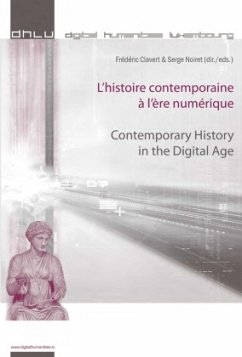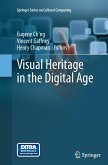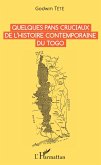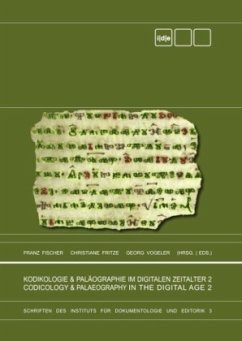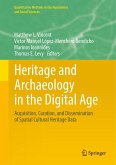L'histoire contemporaine à l'ère numérique - Contemporary History in the Digital Age
Herausgegeben:Noiret, Serge; Clavert, Frédéric
L'histoire contemporaine à l'ère numérique - Contemporary History in the Digital Age
Herausgegeben:Noiret, Serge; Clavert, Frédéric
- Broschiertes Buch
- Merkliste
- Auf die Merkliste
- Bewerten Bewerten
- Teilen
- Produkt teilen
- Produkterinnerung
- Produkterinnerung
Depuis plusieurs décennies, les usages du numérique en histoire se multiplient. Mais l'histoire contemporaine est parfois restée à la marge de ce mouvement. Ce livre, qui recouvre divers usages du numérique, ses outils, ses méthodes, sera à la fois une bonne introduction pour les historiens désirant se renseigner sur les usages informatiques en histoire contemporaine, et un outil utile aux chercheurs et aux enseignants plus rompus à cette utilisation. Cet ouvrage leur permettra de comparer leurs pratiques et de les approfondir dans le cadre des humanités numériques. Digital practices in the…mehr
Andere Kunden interessierten sich auch für
![Visual Heritage in the Digital Age Visual Heritage in the Digital Age]() Visual Heritage in the Digital Age74,99 €
Visual Heritage in the Digital Age74,99 €![Quelques pans cruciaux de l'histoire contemporaine du Togo Quelques pans cruciaux de l'histoire contemporaine du Togo]() Têtêvi Godwin Tété-AdjalogoQuelques pans cruciaux de l'histoire contemporaine du Togo25,00 €
Têtêvi Godwin Tété-AdjalogoQuelques pans cruciaux de l'histoire contemporaine du Togo25,00 €![Kodikologie und Paläographie im digitalen Zeitalter 2 - Codicology and Palaeography in the Digital Age 2 Kodikologie und Paläographie im digitalen Zeitalter 2 - Codicology and Palaeography in the Digital Age 2]() Kodikologie und Paläographie im digitalen Zeitalter 2 - Codicology and Palaeography in the Digital Age 259,00 €
Kodikologie und Paläographie im digitalen Zeitalter 2 - Codicology and Palaeography in the Digital Age 259,00 €![Heritage and Archaeology in the Digital Age Heritage and Archaeology in the Digital Age]() Heritage and Archaeology in the Digital Age95,99 €
Heritage and Archaeology in the Digital Age95,99 €![Digital Van Berkel. Diagrams, Processes, Models of UNStudio Digital Van Berkel. Diagrams, Processes, Models of UNStudio]() Andrea SollazzoDigital Van Berkel. Diagrams, Processes, Models of UNStudio13,99 €
Andrea SollazzoDigital Van Berkel. Diagrams, Processes, Models of UNStudio13,99 €![Digital History Handbook Digital History Handbook]() Digital History Handbook175,99 €
Digital History Handbook175,99 €![Visual Heritage in the Digital Age Visual Heritage in the Digital Age]() Visual Heritage in the Digital Age74,99 €
Visual Heritage in the Digital Age74,99 €-
-
-
Depuis plusieurs décennies, les usages du numérique en histoire se multiplient. Mais l'histoire contemporaine est parfois restée à la marge de ce mouvement. Ce livre, qui recouvre divers usages du numérique, ses outils, ses méthodes, sera à la fois une bonne introduction pour les historiens désirant se renseigner sur les usages informatiques en histoire contemporaine, et un outil utile aux chercheurs et aux enseignants plus rompus à cette utilisation. Cet ouvrage leur permettra de comparer leurs pratiques et de les approfondir dans le cadre des humanités numériques.
Digital practices in the field of history have become more and more widespread in recent decades, but contemporary historians have often tended to remain on the sidelines of this trend. This book, which covers a wide range of digital practices, tools and methods, will serve both as a solid grounding for historians keen to learn how information technology can be applied to contemporary history, and as a useful tool for researchers and lecturers who already have a degree of experience in this area. It will enable scholars to compare and further their practices in the area of digital humanities, providing a comprehensive vision of the emerging field of digital history.
Digital practices in the field of history have become more and more widespread in recent decades, but contemporary historians have often tended to remain on the sidelines of this trend. This book, which covers a wide range of digital practices, tools and methods, will serve both as a solid grounding for historians keen to learn how information technology can be applied to contemporary history, and as a useful tool for researchers and lecturers who already have a degree of experience in this area. It will enable scholars to compare and further their practices in the area of digital humanities, providing a comprehensive vision of the emerging field of digital history.
Produktdetails
- Produktdetails
- Verlag: Peter Lang
- Artikelnr. des Verlages: 574048
- Seitenzahl: 381
- Englisch, Französisch
- Abmessung: 20mm x 150mm x 220mm
- Gewicht: 530g
- ISBN-13: 9782875740489
- ISBN-10: 2875740482
- Artikelnr.: 38624772
- Herstellerkennzeichnung Die Herstellerinformationen sind derzeit nicht verfügbar.
- Verlag: Peter Lang
- Artikelnr. des Verlages: 574048
- Seitenzahl: 381
- Englisch, Französisch
- Abmessung: 20mm x 150mm x 220mm
- Gewicht: 530g
- ISBN-13: 9782875740489
- ISBN-10: 2875740482
- Artikelnr.: 38624772
- Herstellerkennzeichnung Die Herstellerinformationen sind derzeit nicht verfügbar.
Contenu/Contents: Marin Dacos : Cyberclio. Vers une Cyberinfrastructure au coeur de la discipline historique - Gino Roncaglia: Web 2.0 and the Future of Research. New Tools for Research Networks - Andreas Bagias : Organisation et exploitation des archives du Parlement européen dans un environnement électronique - Annick Batard : La presse écrite généraliste française sous l'emprise du Web. Une ressource de l'histoire culturelle contemporaine ? - Éva Deák: Study, Store and Share Unpublished Primary Sources. The Example of the Parallel Archive - Aurore François : Capitaliser les ressources sur l'histoire socio-politique de la justice belge (1795-2005). Le portail just-his.be - Stefan Halikowski-Smith: How Are European National Libraries Responding to «Big Digitization»? - Genaro Vilanova Miranda de Oliveira: Heterographies in Historiography. The Web and Perspectives on Historical Writing - Patrick Peccatte : Une plate-forme collaborative pour la redocumentarisation d'un fonds photographique historique - Serge Noiret: Digital History 2.0 - Tsuriel Rashi/Isaac Hershkovitz: The Media Memory Agenda and the Struggle against Holocaust Deniers - Gerben Zaagsma: Using Digital Sources in Historical Research. Jewish History on the Internet - Olivier Le Deuff : Nouveaux outils et science. L'archéologie pour faire « sens » - Tito Menzani: When the Web is Useful for Scientific Output. The Case of Italian Historiography on the Cooperative Movement - Alain Michel/Shadia Kilouchi: Renault-Billancourt' C5 Workshop in the Digital Age. A New Story of the 1922 Assembly Line - Philippe Rygiel : La diffusion des produits de la recherche historique à l'ère du Web 2.0. Une étude de cas - David J. Bodenhamer: The Spatialization of History. A New Web Paradigm - Marie-Pierre Besnard : Renouveler l'expérience muséale à l'heure du Web. Le e-musée - Milagros Garcia Perez/Cristina Blanco Sio-Lopez: Interacting Localities. The Case of the «Biblioteca Municipal de Estudios Locais» de La Coruña (BMEL) and its Projects on Collaborative Online Library Systems for the Study of Contemporary History - Richard Hacken: Online Primary Documentation of Contemporary History. Trends, Changes and Consequences in the New Millennium - Élodie Nowinski: «Last Nite Deezer saved my class». Écrire et enseigner l'histoire du rock - Enrica Salvatori: Listening to, Watching, Living and, Ultimately, Learning History. On and off the Web.Contenu/Contents: Marin Dacos : Cyberclio. Vers une Cyberinfrastructure au coeur de la discipline historique - Gino Roncaglia: Web 2.0 and the Future of Research. New Tools for Research Networks - Andreas Bagias : Organisation et exploitation des archives du Parlement européen dans un environnement électronique - Annick Batard : La presse écrite généraliste française sous l'emprise du Web. Une ressource de l'histoire culturelle contemporaine ? - Éva Deák: Study, Store and Share Unpublished Primary Sources. The Example of the Parallel Archive - Aurore François : Capitaliser les ressources sur l'histoire socio-politique de la justice belge (1795-2005). Le portail just-his.be - Stefan Halikowski-Smith: How Are European National Libraries Responding to "Big Digitization"? - Genaro Vilanova Miranda de Oliveira: Heterographies in Historiography. The Web and Perspectives on Historical Writing - Patrick Peccatte : Une plate-forme collaborative pour la redocumentarisation d'un fonds photographique historique - Serge Noiret: Digital History 2.0 - Tsuriel Rashi/Isaac Hershkovitz: The Media Memory Agenda and the Struggle against Holocaust Deniers - Gerben Zaagsma: Using Digital Sources in Historical Research. Jewish History on the Internet - Olivier Le Deuff : Nouveaux outils et science. L'archéologie pour faire " sens " - Tito Menzani: When the Web is Useful for Scientific Output. The Case of Italian Historiography on the Cooperative Movement - Alain Michel/Shadia Kilouchi: Renault-Billancourt' C5 Workshop in the Digital Age. A New Story of the 1922 Assembly Line - Philippe Rygiel : La diffusion des produits de la recherche historique à l'ère du Web 2.0. Une étude de cas - David J. Bodenhamer: The Spatialization of History. A New Web Paradigm - Marie-Pierre Besnard : Renouveler l'expérience muséale à l'heure du Web. Le e-musée - Milagros Garcia Perez/Cristina Blanco Sio-Lopez: Interacting Localities. The Case of the "Biblioteca Municipal de Estudios Locais" de La Coruña (BMEL) and its Projects on Collaborative Online Library Systems for the Study of Contemporary History - Richard Hacken: Online Primary Documentation of Contemporary History. Trends, Changes and Consequences in the New Millennium - Élodie Nowinski: "Last Nite Deezer saved my class". Écrire et enseigner l'histoire du rock - Enrica Salvatori: Listening to, Watching, Living and, Ultimately, Learning History. On and off the Web.
Contenu/Contents: Marin Dacos : Cyberclio. Vers une Cyberinfrastructure au coeur de la discipline historique - Gino Roncaglia: Web 2.0 and the Future of Research. New Tools for Research Networks - Andreas Bagias : Organisation et exploitation des archives du Parlement européen dans un environnement électronique - Annick Batard : La presse écrite généraliste française sous l'emprise du Web. Une ressource de l'histoire culturelle contemporaine ? - Éva Deák: Study, Store and Share Unpublished Primary Sources. The Example of the Parallel Archive - Aurore François : Capitaliser les ressources sur l'histoire socio-politique de la justice belge (1795-2005). Le portail just-his.be - Stefan Halikowski-Smith: How Are European National Libraries Responding to «Big Digitization»? - Genaro Vilanova Miranda de Oliveira: Heterographies in Historiography. The Web and Perspectives on Historical Writing - Patrick Peccatte : Une plate-forme collaborative pour la redocumentarisation d'un fonds photographique historique - Serge Noiret: Digital History 2.0 - Tsuriel Rashi/Isaac Hershkovitz: The Media Memory Agenda and the Struggle against Holocaust Deniers - Gerben Zaagsma: Using Digital Sources in Historical Research. Jewish History on the Internet - Olivier Le Deuff : Nouveaux outils et science. L'archéologie pour faire « sens » - Tito Menzani: When the Web is Useful for Scientific Output. The Case of Italian Historiography on the Cooperative Movement - Alain Michel/Shadia Kilouchi: Renault-Billancourt' C5 Workshop in the Digital Age. A New Story of the 1922 Assembly Line - Philippe Rygiel : La diffusion des produits de la recherche historique à l'ère du Web 2.0. Une étude de cas - David J. Bodenhamer: The Spatialization of History. A New Web Paradigm - Marie-Pierre Besnard : Renouveler l'expérience muséale à l'heure du Web. Le e-musée - Milagros Garcia Perez/Cristina Blanco Sio-Lopez: Interacting Localities. The Case of the «Biblioteca Municipal de Estudios Locais» de La Coruña (BMEL) and its Projects on Collaborative Online Library Systems for the Study of Contemporary History - Richard Hacken: Online Primary Documentation of Contemporary History. Trends, Changes and Consequences in the New Millennium - Élodie Nowinski: «Last Nite Deezer saved my class». Écrire et enseigner l'histoire du rock - Enrica Salvatori: Listening to, Watching, Living and, Ultimately, Learning History. On and off the Web.Contenu/Contents: Marin Dacos : Cyberclio. Vers une Cyberinfrastructure au coeur de la discipline historique - Gino Roncaglia: Web 2.0 and the Future of Research. New Tools for Research Networks - Andreas Bagias : Organisation et exploitation des archives du Parlement européen dans un environnement électronique - Annick Batard : La presse écrite généraliste française sous l'emprise du Web. Une ressource de l'histoire culturelle contemporaine ? - Éva Deák: Study, Store and Share Unpublished Primary Sources. The Example of the Parallel Archive - Aurore François : Capitaliser les ressources sur l'histoire socio-politique de la justice belge (1795-2005). Le portail just-his.be - Stefan Halikowski-Smith: How Are European National Libraries Responding to "Big Digitization"? - Genaro Vilanova Miranda de Oliveira: Heterographies in Historiography. The Web and Perspectives on Historical Writing - Patrick Peccatte : Une plate-forme collaborative pour la redocumentarisation d'un fonds photographique historique - Serge Noiret: Digital History 2.0 - Tsuriel Rashi/Isaac Hershkovitz: The Media Memory Agenda and the Struggle against Holocaust Deniers - Gerben Zaagsma: Using Digital Sources in Historical Research. Jewish History on the Internet - Olivier Le Deuff : Nouveaux outils et science. L'archéologie pour faire " sens " - Tito Menzani: When the Web is Useful for Scientific Output. The Case of Italian Historiography on the Cooperative Movement - Alain Michel/Shadia Kilouchi: Renault-Billancourt' C5 Workshop in the Digital Age. A New Story of the 1922 Assembly Line - Philippe Rygiel : La diffusion des produits de la recherche historique à l'ère du Web 2.0. Une étude de cas - David J. Bodenhamer: The Spatialization of History. A New Web Paradigm - Marie-Pierre Besnard : Renouveler l'expérience muséale à l'heure du Web. Le e-musée - Milagros Garcia Perez/Cristina Blanco Sio-Lopez: Interacting Localities. The Case of the "Biblioteca Municipal de Estudios Locais" de La Coruña (BMEL) and its Projects on Collaborative Online Library Systems for the Study of Contemporary History - Richard Hacken: Online Primary Documentation of Contemporary History. Trends, Changes and Consequences in the New Millennium - Élodie Nowinski: "Last Nite Deezer saved my class". Écrire et enseigner l'histoire du rock - Enrica Salvatori: Listening to, Watching, Living and, Ultimately, Learning History. On and off the Web.

